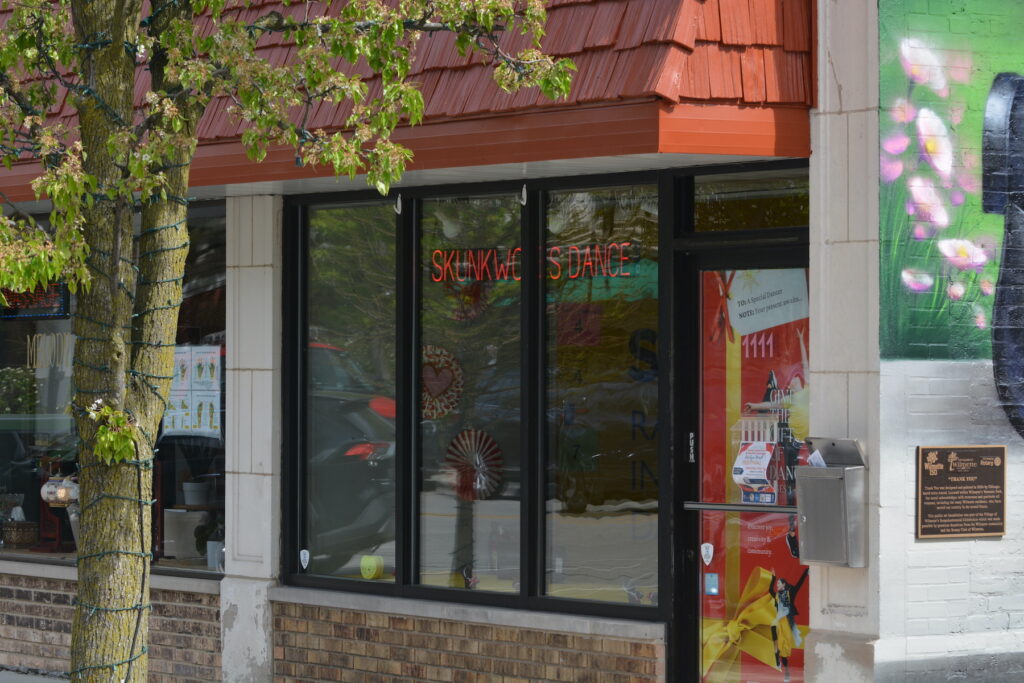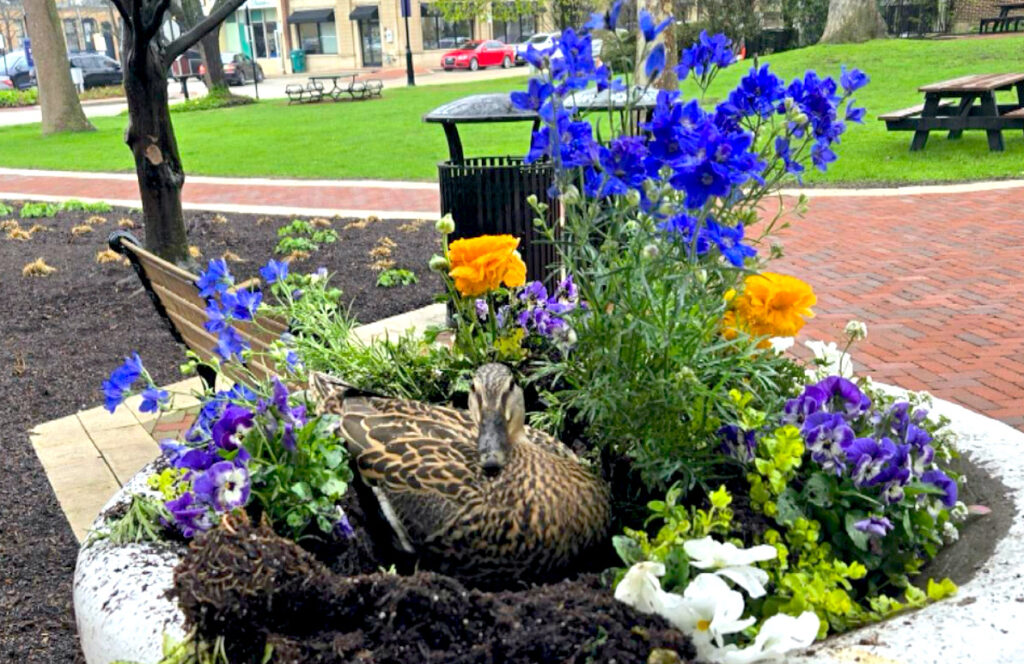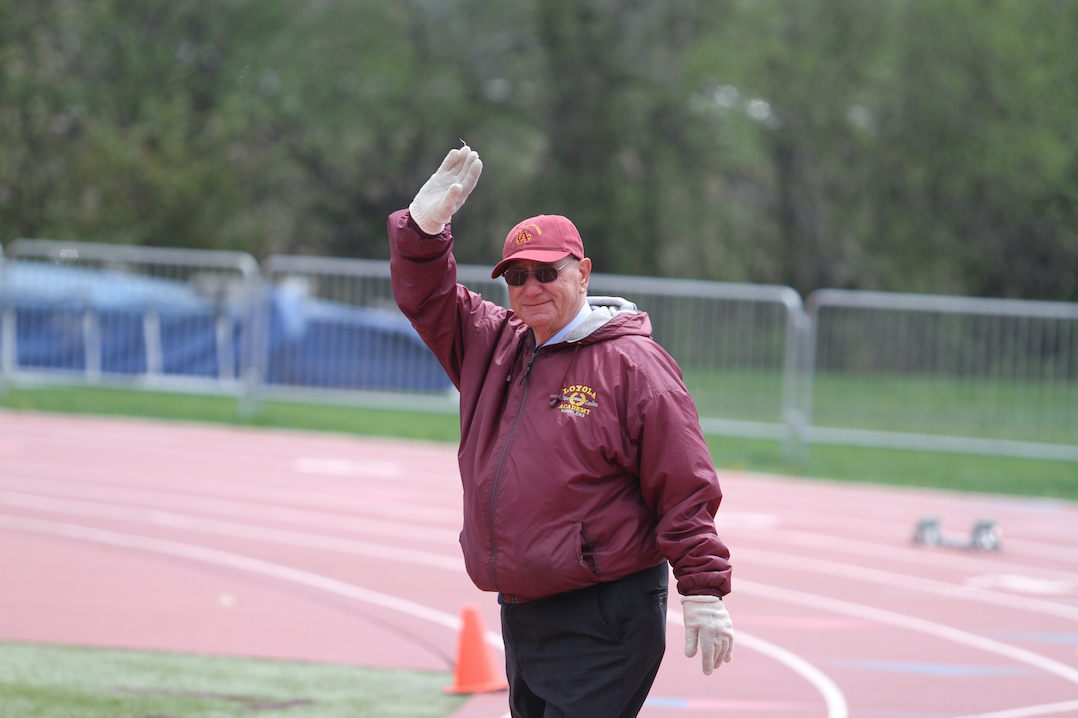
In Tribute: The legacy of Frank Amato, a Loyola Academy legend
They came from near and far — to Donellan Family Funeral Services in Skokie for the visitation on Friday evening, Feb. 10, and to Our Lady of Perpetual Help in Glenview, where every pew was occupied, for the Requiem Mass on Saturday morning, Feb. 11.
They came to celebrate the life and honor the memory of Frank Amato, “one of the rocks of Loyola Academy” from 1966-2013, when he coached, taught and served as an administrator.
“Coach built an unrivaled career marked by exceptional achievement, to be sure, but more importantly by a generosity of spirit, a quiet dignity and an authentic paternal presence,” began a press release from Loyola Academy, mourning his death.
“For over a half century, coach Amato was one of the rocks of Loyola Academy, a constant that helped define the very tradition and spirit of the academy. Coach Amato was truly one of the finest.”
“Coach Amato was all of the best of Loyola Academy,” agreed Katie Seeberg, a 2001 graduate who ran on the track team and has returned to the school as an English teacher and assistant cross-country coach. “The record book will point to countless titles, championships and awards but coach’s greatest legacy was how he made people feel. He had this remarkable way of making you feel like you were very special and that you could do it.
“That easy gait, that warm smile, that trademark wave — all marks of a man who taught and coached and lived with grace, humility and love.”
Amato died at age 96 of aspiration pneumonia on Saturday, Jan. 28, at Glenbrook Hospital. Preceding him in death was Alice, his beloved wife of 71 years who died in July 2022. The couple spent most of the years he coached at Loyola living in Wilmette and raising their five children across the street from the high school before moving to an assisted living facility in Glenview in 2021.
“We think of Frank and Alice as Mr. and Mrs. Loyola Academy,” OLPH pastor Rev. Jerry Boland said during his homily. “They are so fondly remembered and revered.”
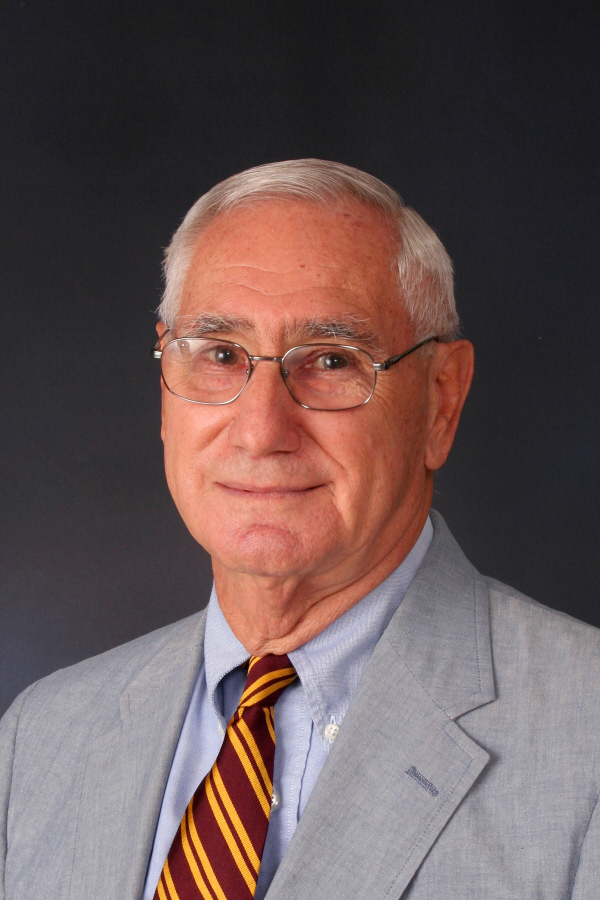
In the beginning
A child of the Depression and a Marine Corps member of The Greatest Generation, Amato was born on Christmas Eve in 1926 in Kingston, N.Y., where he grew up. In high school, he excelled as a fullback on the football team and a hurdler on the track team.
Amato was a middle-aged man, 39 years old, when he came to Loyola to serve as head track coach and assistant football coach and teach physical education.
Prior to his arrival at Loyola — where he became one of the nation’s most successful high school track coaches — he’d led a somewhat nomadic life.
Amato enlisted in the Marine Corps after graduating from high school. He was on a troop ship in the Pacific Ocean, preparing for an invasion of Japan, when World War II ended. He then was sent to northern China as a member of the army of occupation.
“He could have been drafted into the Army but he chose to enlist in the Marines,” his emotion-choked son, Frank Jr., said in one of the eulogies that followed the Mass at OLPH. “The Marines were known as the toughest (branch of service); the Marines were known as the best.
“When I asked him why he chose the Marines, he told me: ‘If you want to be the best, you want to be challenged.’”
Following Amato’s honorable discharge he went to the University of Notre Dame to play football for coach Frank Leahy’s dynasty and was a member of the freshman team. Although his career ended abruptly because of a knee injury, he accepted Leahy’s offer to remain with the team until he graduated in 1952.
After the 1948 Notre Dame-Northwestern game, Amato went on a blind date with a young woman named Alice Ruszkowski from nearby Mishawaka, Ind., beginning their 71-year love affair.
Frank and Alice were married in 1951 and after he came to Loyola she worked for 28 years in the business office, starting in 1970.
Finding Loyola
His first job took the couple to Virginia, where he began his coaching career, working for four years with the football, basketball, baseball and track teams at Norfolk Catholic. From there he moved to Illinois for another multi-tasking coaching job at St. Thomas in Rockford followed by coaching stints at St. George in Evanston, Immaculate Conception in Elmhurst and finally, Loyola.
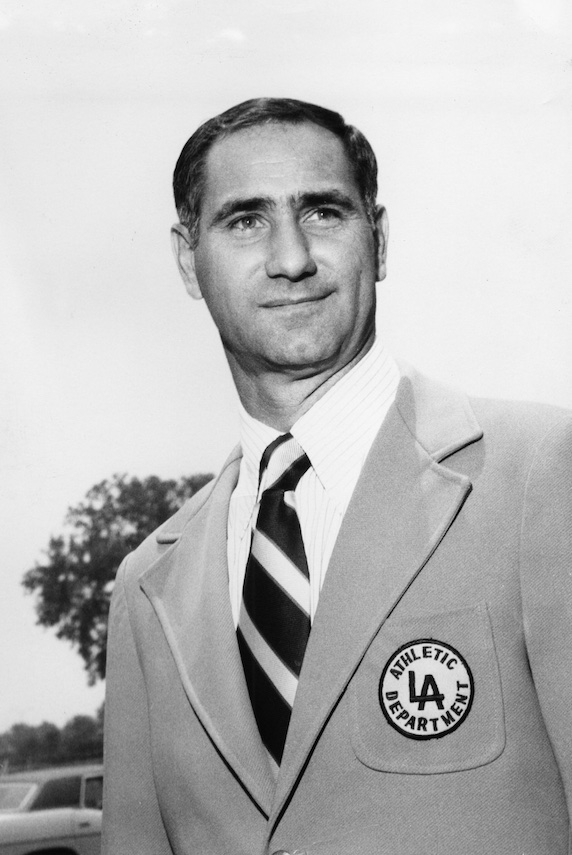
During his early years at Loyola he received overtures to join coach Ara Parseghian’s staff at Notre Dame and be in charge of recruiting but he decided to remain a Rambler and become “an institution.”
“He did so many things in so many different capacities,” said Genevieve Atwood, Loyola’s vice president for athletics and fitness, who spent four years as an assistant track and cross-country coach for the Ramblers, starting in the spring of 2006. “He was an institution. He had an innate way of making a personal connection with all those kids and pushing his athletes to do their best. He made them feel valued.”
Amato’s legacy lives on through his coaches.
Katie Seeberg’s father is Dan Seeberg, the head coach of the boys track team, who was a hurdler, sprinter and runner on Amato’s teams from 1971-75 and a running back and defensive back on the football team when Amato was its assistant coach. Seeberg returned to Loyola in 1987 to coach and teach.
The head coach of the girls track team, ChrisJon Simon, is another protégé: an 800-meter runner and miler from 1982-86 who came back to join the coaching staff before the 1994 season.
Katie Seeberg is one of six current assistants who competed on Amato’s teams, joining Dave Behof, Josh Ward, Ryan Gibbons, Tony Belmont and Johnny Miller.
“His belief in every athlete he coached led them to believe in themselves and excel on the field, on the track and in life,” Behof said. “Pre-meet talk — including the themes of ‘competing versus participating’ and ‘the standards and traditions of Loyola Academy’ — unites decades of Loyola Academy track athletes.”
Drew Bryant was proudly wearing his 2006 Loyola track letter jacket when he paid his respects at Donellan Family Funeral Services.
“I felt coach Amato was behind me 100 percent and I was behind him 100 percent,” Bryant said. “I was willing to do whatever he asked.”
Bill Cerney, who ran for Amato and played on the football team when he was an assistant coach, came to the wake with his wife, Geryl, the school’s retired comptroller, and their daughter, Lauren, another former track athlete.
“Coach helped me to get a football scholarship to Illinois,” Cerney said. “After college I came back and coached for him (as an assistant) for two years. He is the one who talked Lauren into going out for track and at her senior banquet he pointed out that she had won the most championships of anyone in the (girls) Catholic League during her four years.”
Geryl pointed out that Lauren was a Level 10 gymnast when she came to Loyola in 1995 and that fall would be excused from school at 1:30 p.m. so she could train for gymnastics.
But Amato’s power of persuasion prompted Lauren to come out for track and compete in the hurdles, jumps and sprints.
“I decided I wanted to do track so I quit gymnastics because I couldn’t do both,” she recalled.
During his homily, Father Boland pointed out that when Loyola became a coed school after its merger with Marillac in 1994, Amato hated the thought of coaching girls, believing that they’d “be fidgety and crying all the time but then, all of a sudden after he started coaching them, he became the greatest advocate of girls athletics.
“It was a great honor to coach the girls,” he told The Wilmette Beacon when he retired in 2013. “I discovered girls are as good athletically and as devoted as the boys.”
“One of the greatest things about coach Amato was he had the ability to adapt, to keep adjusting to the realities,” Boland said. “He was a deep believer in what he was doing, encouraging people to be the best. And he never forgot where he came from and those whose lives he touched.”
Winning ways
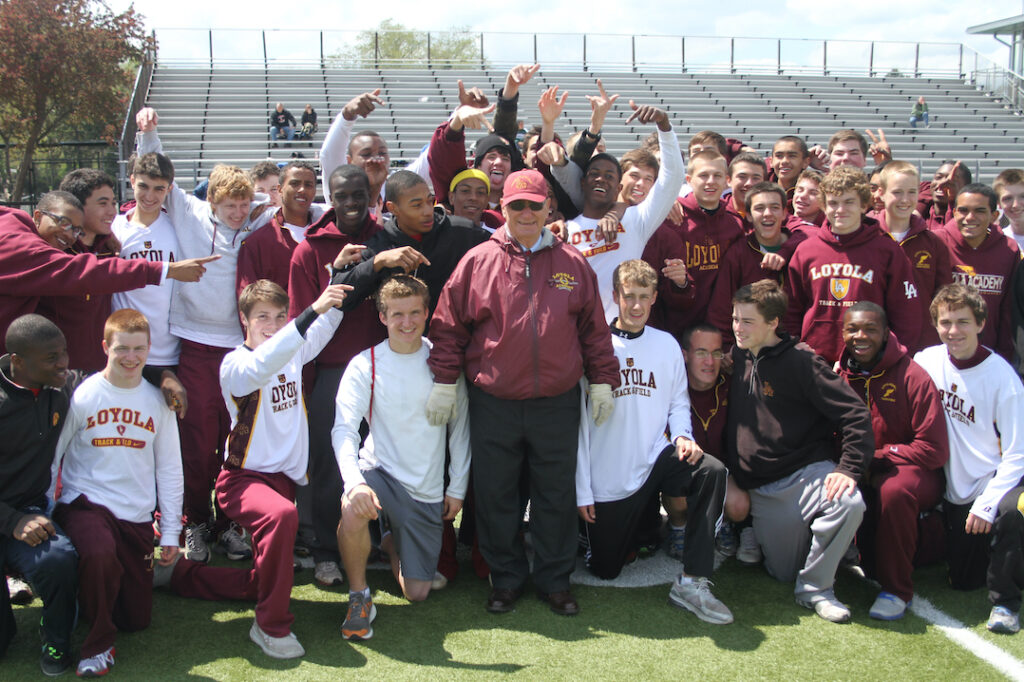
Amato’s teams practiced what he preached. During his 47 years as the Loyola boys track coach, the Ramblers won 30 Chicago Catholic League indoor and outdoor championships and finished second 20 times. After girls came to Loyola in the mid-1990s under Amato they earned 13 Girls Catholic Athletic Conference titles.
Highlighting his 10 seasons as an assistant football coach, he served as the line coach of the 1966 Prep Bowl champions and as backfield coach of the undefeated 1999 team that won the Prep Bowl. Before Catholic schools entered the Illinois High School Association in the 1974-75 school-year the Prep Bowl that pitted the Chicago Catholic and Public League champions against one another in Soldier Field was the state’s biggest game for Catholic teams.
Amato also was the backfield coach after the Ramblers entered the IHSA and made it to the Final Four in 1975.
Amato’s coaching achievements earned him innumerable accolades. He earned 10 Lawless Awards as the Chicago Catholic League Coach of the Year in track and field. Twice he was named CCL Man of the Year.
In 1985 he was inducted into the Chicago Catholic League Hall of Fame and Illinois Track and Field Coaches Hall of Fame, and in 2011 he was selected National Coach of the Year for Boys’ Track and Field by the National High School Athletic Coaches Association.
In Amato’s honor, Loyola instituted the Frank J. Amato Excellence in Coaching Award, presented annually to a Rambler coach for his achievements on and off the field, and a group of alumni established the Frank J. Amato Track and Field Award that includes a college scholarship allowance for a senior member of the team in recognition of outstanding performance in the classroom and on the track.
Frank is survived by three sons, Frank Jr., Tony and John; two daughters, Mary (Joseph III) Nimrod and Ann (Christopher) Hutching; nine grandchildren; and a few great-grandchildren.
The grandchildren served as pallbearers and one of them, Emily Nimrod, delivered a eulogy.
Retired Colonel Christopher J. O’Donnell delivered a eulogy on behalf of the Marine Corps.
“He was a man or honor and dignity,” O’Donnell told the congregation. “His family stretched to Loyola, the Marine Corps and the people he coached.”
Two Marines served as honor guards, unfolding an American flag over Amato’s casket and standing at attention. After taps was played they removed the flag, refolded it and marched to the rear of the church.
The Notre Dame Victory March was the second of two recessional hymns.
Internment was in Sacred Heart Cemetery in Northbrook.
The Record is a nonprofit, nonpartisan community newsroom that relies on reader support to fuel its independent local journalism.
Become a member of The Record to fund responsible news coverage for your community.
Already a member? You can make a tax-deductible donation at any time.
Neil Milbert
Neil Milbert was a staff reporter for the Chicago Tribune for 40 years, covering college (Northwestern, Illinois, UIC, Loyola) and professional (Chicago Blackhawks, Bulls, horse racing, more) sports during that time. He won a Pulitzer Prize for his work on a Tribune travel investigation and has covered Loyola Academy football since 2011.

